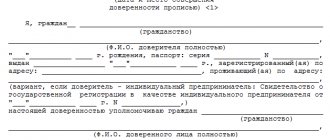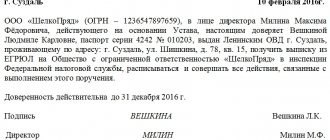Source: RosKvartal® - Internet service No. 1 for management organizations
If the owner of a premises in an apartment building cannot take part in the general meeting due to illness, lack of professional knowledge, childhood or incapacity, in this case the Housing Code of the Russian Federation provides for the right to vote through an authorized representative ( Part 1 of Article 48 of the Housing Code of the Russian Federation).
The owner’s representative can act (Part 2 of Article 48 of the RF Housing Code):
- by proxy,
- on the basis of the law,
- on the basis of an act of an authorized government body.
General power of attorney for an apartment
In accordance with civil legislation (Article 185.1 of the Civil Code of the Russian Federation), notarization requires a power of attorney for concluding transactions that require a notarized form of certification, or actions that involve making changes to state registers. Since all rights to real estate are recorded in the state register of rights to real estate, the general power of attorney in question must be drawn up in notarial form.
When drawing up such a power of attorney, the principal must understand the consequences of his actions. By issuing a general power of attorney for an apartment, you give a third party the right to dispose of your real estate at their own discretion on completely legal grounds.
The only restriction on alienation rights is a gift transaction.
You can donate your apartment (or other real estate) only if you explicitly provide in the power of attorney not only the right of donation, but also the name of the recipient. Well, of course, a trustee also cannot bequeath real estate on your behalf, since a will is always drawn up in the presence of the testator and personally signed by him (with the exception of cases with hands). In this case, the authorized person can exchange, sell, lease (hire), pledge, register any changes with government agencies, and sign all documents necessary to complete such transactions.
Procedure for registration and cancellation of a power of attorney
To issue a general power of attorney, the principal must contact any notary and have with him a passport, a certificate of ownership of the apartment (or other real estate), a document confirming the grounds for the transfer of ownership rights to you (sales agreement, deed of gift, certificate of inheritance ), as well as a copy of the passport or passport details of the authorized representative.
If the power of attorney provides for the right to make a gift, then passport data and the full name of the donee are also required. Depending on each individual case, the notary may request other documents. You should also understand the procedure for revoking such a power of attorney. The fact is that in the event of cancellation of the power of attorney, the principal must notify not only the authorized person, but also all third parties known to him who have entered into legal relations with the representative. In the case of a general power of attorney, it can be problematic to comply with this condition.
Notaries recommend not issuing this type of power of attorney. It is better to directly indicate the rights that the principal must perform in order to avoid unpleasant surprises in the future. And as judicial practice shows, such an opinion is not unfounded.
Authority
There are powers of attorney for the management and disposal of property. Practice shows that these concepts are often confused. But there are significant differences here. Thus, a power of attorney for property management allows you to make various transactions with it, for example, renting it out. But the owner does not lose ownership rights.
As for disposition, the representative can even sell, exchange, donate and alienate property, depriving the owner of the property rights. The attorney may also receive money for the property sold. Typically, such rights are vested with the help of a general power of attorney. Naturally, to register it you will need to contact a notary office.
The principal is advised to carefully consider what powers he will grant to the attorney. After all, the text of the document must indicate the actions that the representative will perform. Do not forget that if some actions are not specified, the representative will not be able to perform them. If the owner fully trusts the representative, he gives him a fairly large list of powers. For their convenient perception, it is recommended to indicate the powers in separate paragraphs.
When noting powers, it is necessary to pay attention to whether the representative is allowed to draw up a sub-power of attorney. If there is no such authority, you need to write it like this: “Without the right of subrogation.” It would be useful to additionally indicate whether the representative is allowed to receive funds. If allowed, then you can mark in what way.
Who can be a confidant
If the principal appoints as attorney a person who is officially declared incompetent, such document will be considered invalid. The authorized person must be responsible for his actions; accordingly, he must be a legally capable and adult citizen.
There is an opinion that only close relatives can dispose of property by proxy. However, it is erroneous. The principal has the right to grant certain powers even to a stranger. Here the owner of the property decides exclusively.
As mentioned above, alienation of property by power of attorney is a fairly significant procedure. That is why such a document will have to be drawn up by a notary. It is worth noting that the attorney himself may not come to the notary’s office. The principal must bring a copy of his passport. Although a power of attorney can be issued without it. In fact, a notary can draw up a document simply from the words of the principal. He must provide the attorney's details and present his passport. The object of the transaction itself is also described in detail, and a document confirming ownership is presented.
It is not at all necessary that the representative be a private person. Today there are specialized companies that provide various property-related services. Thus, the owner has the right to entrust his powers to the entire company. Naturally, in this case the document must have the right of substitution. This is necessary so that the head of the specialized company, to whom the power of attorney is issued, transfers the necessary powers to a specific specialist.
For what period is a general power of attorney issued?
The validity period of the general power of attorney is determined in accordance with the provisions of Art.
186 Civil Code. This is a general rule that governs the duration of any power of attorney. The law does not provide for requirements for the minimum and maximum validity periods of a document. The previously existing limitation of the power of attorney term of 3 years was abolished back in 2013 by the Law “On Amendments...” dated 05/07/2013 No. 100-FZ.
When issuing a power of attorney, it is not necessary to indicate the validity period of the document. If it is not specified, the power of attorney will be valid for exactly 1 year from the date of issue. If you directly indicate a different period—more or less—then the power of attorney will be valid until that time expires.
An important requirement for a power of attorney is the need to indicate the date of its preparation. Otherwise, the document is considered void and does not entail any legal consequences. Specifying the date allows you to determine the beginning of the power of attorney.
Let's sum it up
You determine the powers of the trustee under a general power of attorney yourself. Within the limits of the law, a representative can conduct transactions for you, sign documents and receive money. But whether to allow such actions or not is up to you. Selling an apartment by proxy is potentially dangerous for the seller and the buyer, but the use of certain protective mechanisms can protect the parties to the transaction from loss of rights to the apartment and money. If you have questions about using trustees, as well as any other questions about real estate transactions, take advantage of the free consultation with lawyers on this site.
Approximate contents of a power of attorney for the sale, rental and other actions with the apartment
Now let's look at the approximate structure of a notarized power of attorney and its content.
- At the very top, the name of the document (“Power of Attorney”), the place of its issue and the date are indicated. By the way, the date of issue of the power of attorney is a prerequisite for its validity.
- This is followed by the surname, name and patronymic of the principal, indication of citizenship, date and place of birth, his full passport data, information about the authority that issued the document, and address of residence. This is followed by information about your real estate. For example, the address of the location of the apartment, its area, number and date of issue of the certificate of ownership, the basis for acquiring the right.
- Similar information about the trustee is provided below. It is important to say that one power of attorney may indicate several representatives. In this case, everyone can be granted both an individual scope of rights and all the rights specified in the power of attorney.
- The following is information about the order that you trust to be carried out on your behalf. In our case, this means carrying out any transactions with the specified real estate, including alienation by any method not prohibited by law and rental. To do this, the representative is delegated the authority to submit and receive any documents, including certificates, extracts, statements, explanations, and sign all documents necessary for the proper execution of the specified order. As well as representing your interests in all state and non-state bodies or before individuals on issues related to the assignment.
- The following are indicated: the validity period of the power of attorney, an indication of the possibility of reassignment (or the lack of such a possibility), and you confirm that the consequences of issuing the power of attorney and the provisions of the law on powers of attorney have been explained to you. Then the personal signature of the person who issued the power of attorney is affixed.
- After all of the above, the notary’s details are indicated and his personal signature is affixed. With his signature, the notary confirms that the power of attorney was made in his presence, he verified your identity and legal capacity. The number of the power of attorney in the register and information about the amount collected for services are also indicated.
Voting based on the law
Parents (guardians) of minor children most often act on the basis of the law.
By virtue of the Family Code, parents vote for their children; a power of attorney is not required for this. “Parents are the legal representatives of their children and act in defense of their rights and interests in relations with any individuals and legal entities, including in the courts, without special powers” (Part 1 of Article 64 of the Family Code of the Russian Federation). You can confirm your right to vote for your children either with your children’s birth certificate or with your passport.
The powers of the representative of an incapacitated or partially capable owner are confirmed by a document issued by the guardianship and trusteeship authority: a decision to appoint a person as a guardian or trustee.
If the owner of the premises is a legal entity, then on the basis of the law or constituent document the director acts on his behalf (Article 53 of the Civil Code of the Russian Federation).
In this case, it is unlawful to require a power of attorney: it will be enough to request the minutes of the general meeting of owners or shareholders on the appointment of a director to the position and an extract from the Unified State Register of Legal Entities. You can obtain such an extract yourself and for free.
What risks does a general power of attorney pose for the parties?
A general or general power of attorney for real estate assigns to the trustee the maximum number of rights, in particular the right to dispose of real estate belonging to the principal.
In practice, this means that the representative at any time (during the period of validity of the power of attorney) can make almost any transaction on behalf of the owner. Concluding transactions under a general power of attorney carries certain risks both for the owner of the property and for the other party:
- The representative may perform actions with the real estate of the represented person, which the latter may not know about and may not even imagine the possibility of their commission. The transactions concluded by the representative will have to be contested, and this leads to problems both for the person who issued the power of attorney and for the new owner of the property. Therefore, you should not issue general powers of attorney to unfamiliar or untrustworthy people.
- If the power of attorney is revoked, the representative does not have the right to enter into transactions with the property of the former represented person. However, there are situations when the bona fide party to the transaction does not know that the power of attorney has expired. If such a transaction is completed, it may be declared invalid. Therefore, if the seller’s representative acts on the basis of a general power of attorney when concluding a transaction, it is better for the buyer to verify with any notary that the document has not been revoked. Recognizing the transaction as invalid entails the return of the parties to the original position - the seller must return the money, and the buyer is deprived of his rights to the property. However, if the seller refuses to return the money, then collecting it from him will be problematic.
- A representative may make a transaction on terms that are not favorable to the represented person. A general power of attorney, as a rule, does not indicate specific conditions for the disposal of real estate, which may contribute to this. For example, a representative sells an object for less than the owner wanted when drawing up a power of attorney. The trustee’s fulfillment of other verbally agreed (or not agreed upon at all) conditions is not guaranteed. In order to avoid such problems, it is preferable to indicate in the document a list of specific actions that the representative has the right to perform on behalf of the principal.
***
Thus, a general power of attorney can be issued only when the owner of the property knows the representative well and trusts him. Otherwise, it is better to issue a power of attorney only to perform specific actions, for example, to sell a certain apartment for a pre-agreed price.
VAT – 2022
The best speaker on tax topics, , will prepare you for filing your return on January 14 . There are 10 out of 40 places left for the online workshop . The flow is limited, as there will be live communication with the teacher live. Hurry up to get into the group. Sign up>>>
How to revoke a power of attorney
It can be revoked at any time before the end of the official term of the power of attorney.
How to terminate a power of attorney early:
- The first thing to do is to notify a trusted person about this (you can send a letter with acknowledgment of delivery).
- Next, contact a notary with a message about revoking the power of attorney. He can notify the representative himself.
- The duty of the principal becomes to notify third parties about the revocation of the power of attorney: Rosreestr, municipal and judicial authorities, etc. The notary also notifies third parties known to him.
The principal draws up a notice of revocation of the power of attorney in simple written form and sends it by mail. The notary, in the manner of interdepartmental cooperation, is able to promptly notify, for example, the rights registration authority.
An order to revoke a power of attorney can be approved by any notary, not just the one who originally issued the document. The power of attorney must be returned to the principal or notary.
If a power of attorney was issued with the right to sell an apartment, then you can further protect yourself: submit an application to Rosreestr to prohibit the registration of transactions in which you do not personally participate.
What are the risks of transactions with a power of attorney?
A power of attorney to formalize any procedures related to a private home, as well as to conclude transactions with it, carries certain risks, both for the owner of the property and for buyers and tenants. It’s easy to find an example of unpleasant situations for a buyer:
- Concluding a transaction under a power of attorney that has been revoked (Article 188 of the Civil Code of the Russian Federation);
- The death of the principal selling the house, which the representative may remain silent about (you will have to deal with heirs and court proceedings);
- Recognition of the owner as incompetent or partially incompetent (the same Article 188 in the Civil Code);
- Recognition of the owner as missing (accordingly, he is not considered to have not received the funds from the transaction, which means the transaction is canceled, regardless of its notarization and the written form of all agreements).
For the owner, that is, the seller, not everything is so rosy either. Even if the representative has firm confidence and there is no trick on this side, finding a buyer can be very difficult. Quite often it is necessary to significantly reduce the cost before the power of attorney expires, especially when it is not possible to issue a new one soon. In any case, what to do in such cases depends entirely on the owner, his capabilities and personal wishes.
General risks when buying an apartment by proxy
The power of attorney turns out to be fake
This means that the document is not registered in the official register of the Notary Chamber, the seller does not know about its existence and does not sell housing.
This type of fraud is encountered by people who purchase real estate by proxy from single pensioners or orphanage residents. When the real owner realizes that he has been deceived, he goes to court. He recognizes the transaction as void, and the buyer remains on the street. Most often it is not possible to recover the money - the scammer disappears.
For example, in the Irkutsk region, an orphan girl went to court to declare the purchase and sale transaction of her apartment invalid. According to her, she did not sign any documents and does not know how to write or read at all. The examination showed that the power of attorney under which the representative sold the home was fake. The apartment was seized from the new tenant and returned to the previous owner.
The owner revokes the power of attorney, dies before or during the transaction
By law, a power of attorney can be revoked from any notary. Unscrupulous sellers use this right to illegally enrich themselves. The scheme is as follows: they sell housing through a figurehead, agree to receive a deposit or the full amount immediately after signing the contract. While the documents are in Rosreestr, the owner revokes the power of attorney and the buyer is denied registration.
Next, the buyer goes to court, where the owner declares: at the time of the sale he was in a difficult financial situation and sold the property under enslaving conditions. I agree to return the money. The court orders a monthly return from salary or pension, but the seller turns out to be unemployed or his pension is on the verge of the subsistence level.
When the owner dies, the power of attorney also becomes invalid. The seller's heirs have the right to declare the transaction void in court.
There have been no court decisions on this risk in Russia yet, but there are many stories on specialized forums from those who have encountered it. Therefore, consider the likelihood of such events occurring.
It is impossible to verify the adequacy of the owner
By law, a power of attorney on behalf of an incapacitated citizen is issued by his guardian. But often relatives do not bother with bureaucratic procedures and do not formalize guardianship. This plays into the hands of scammers: they ingratiate themselves with the owner and persuade him to issue a power of attorney under any pretext. At the time of signing, the notary may have no complaints about the condition of the homeowner: he is not a doctor and will not discern the hidden course of the disease.
When relatives find out about the scam, they are outraged and want to return the property. They formalize guardianship, prove the owner’s incapacity and file a lawsuit. Thus, the power of attorney becomes invalid. The transaction is considered void.
In the Voronezh region, a woman went to court to have the power of attorney she had issued invalid. She reported that at the time of signing the document she felt unwell, was anxious and embarrassed to ask questions to the notary. The woman was sent for a psychological and psychiatric examination, where experts identified mental characteristics that had a significant impact on the perception and assessment of her actions. The woman simply did not understand what she was doing. The court declared the power of attorney invalid and the transaction void.
The owner is aged and does not account for his actions
Not every older salesperson is incompetent. This makes the situation more complicated: a completely healthy pensioner can issue a power of attorney under the influence of emotions or due to legal illiteracy. He becomes a target for both scammers and young relatives.
When the owner remains on the street, he quickly understands what actions led to the consequences. He makes the situation public, goes to court, and the court takes his side. Since the owner did not receive the money (the scammers received it), he has nothing to return. Then the buyer sues the representative. Theoretically, it is possible to collect what is owed, but the buyer wastes time, nerves and money on litigation without a specific forecast for the result.
There was such a legal dispute in the Krasnodar region. An elderly woman gave her daughter a power of attorney to buy her an apartment. The daughter fulfilled the order, and the happy mother did not even think about revoking the power of attorney. After a while, the daughter independently sold the property to a third party using the same document. The woman went to court with a demand to invalidate it: she did not understand the consequences of issuing a power of attorney and did not know that it needed to be revoked after the transaction. The court upheld the claim, and the buyers remained on the street.
How to draw up a power of attorney correctly - use a template or contact a lawyer?
A power of attorney is a document that requires literacy and accuracy; if you doubt your knowledge, it is better to contact a notary
It is very important to draw up such a document correctly.
Notarized powers of attorney are drawn up in special organizations and certified there. The notary has his own sample power of attorney.
It is important to understand that any power of attorney must include complete information about the person who provides trust and issues this document.
Exactly the same data is indicated about the person to whom this trust is placed. In addition, the specified document must contain the date and place of its preparation.
If we talk about the template of this document, it should be noted that it is drawn up in writing or printed. There are no restrictions here.
But the condition of legible handwriting is considered mandatory. And it must be compiled in the language of the country in which it will be used, there must be no grammatical errors.
The contents of the document extensively and accurately describe all types of actions that can be performed by the trustee. This is extremely important, since powers are limited by the scope of this type of documentation.
To prepare such a document yourself, you can use a sample template, but you should understand that, most likely, a notary will not certify it.
Another option for drawing up such a power of attorney could be the help of a legally competent person.
By and large, there is no difference in concluding a transaction with or without the presence of the owner. Usually everything goes well when the people are adequate and there are no fraudulent activities in the transaction.
Key Features
The notary, after checking the required documents presented, formalizes the powers of the trustee, recording the details independently. To do this, he has a letterhead on which the necessary information is entered. This greatly simplifies and speeds up the procedure, ensuring compliance with all legal regulations.
A general power of attorney for a house can be supplemented by the transfer of rights to sell real estate, its exchange, to sell a share of property, as well as inheritance procedures. The notary is also obliged to record his last name, first name, patronymic in the document, put the date of signing and his seal.
It is important to pay special attention to the validity period of the power of attorney. It is highly advisable to indicate a specific date until which the document remains valid. If you do not specify anything, the general power of attorney will automatically be considered valid for one year. Upon conclusion of the necessary transaction, the authorized person also has the right to apply to Rosreestr on behalf of the principal for registration, having with him a list of the requested documents:
- Agreement on the sale of a house in ownership on behalf of the principal;
- Act of acceptance and transfer of property;
- Receipt for payment of state duty;
- Technical documentation for the facility.
Before issuing a general power of attorney, it is necessary to determine whether the representative will have the right to reissue the power of attorney to another person on behalf of the owner of the house. If there is no prohibition on this in the document, permission is automatically given by law.









